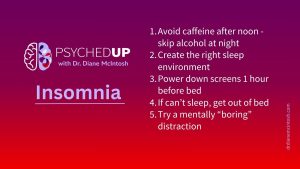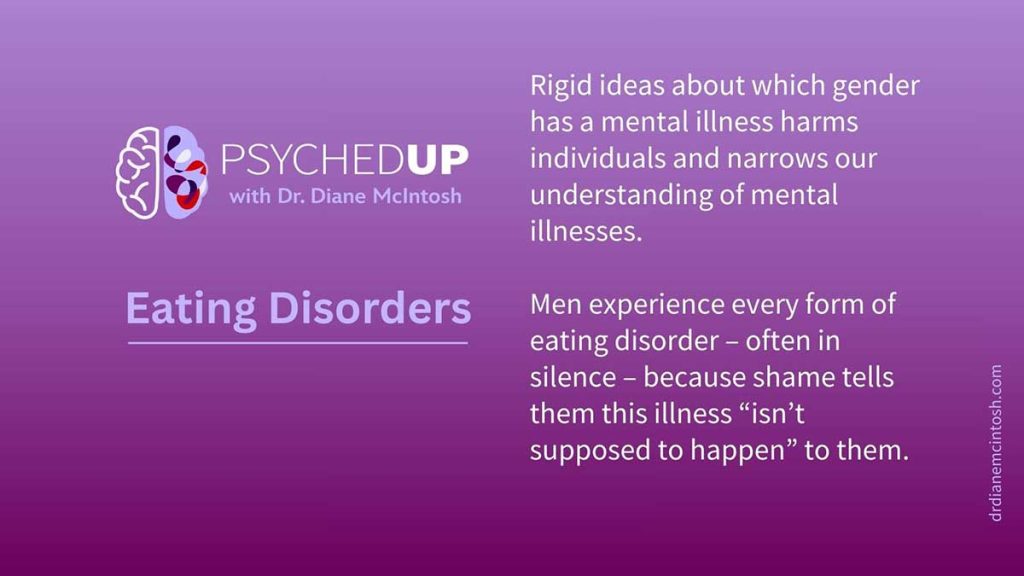
Struggling With Sleep? Here Are My Top Five Tips for Better Rest
I want to share my top five “sleep hygiene” habits that can support healthier sleep. They won’t solve chronic insomnia on their own, but they are essential ingredients for better rest.

Many people think of some mental illnesses as belonging to one sex or another. Anxiety is a “women’s problem” – of course, we women are prone to “fits of the vapours!” ADHD is a disorder that primarily afflicts boys. And eating disorders? Those affect young women. These beliefs are inaccurate and problematic.
While it’s true that some psychiatric disorders occur more commonly in one sex or the other, every mental illness can affect either sex. Unfortunately, sex-based stereotypes can keep people from seeking help, because they add to the shame that is already so deeply tied to mental illness.
In my latest episode of PSYCHEDUP, I spoke with Cedar, who shared her story of living with anorexia nervosa, an eating disorder that’s often misunderstood and oversimplified. Eating disorders are not about vanity, or even food, and they can affect anyone, regardless of gender, age, or background.
For decades, research, awareness campaigns, and even treatment programs have focused almost exclusively on women and girls. As a result, men with eating disorders are often dismissed and never diagnosed. Yet men experience every form of eating disorder, including anorexia nervosa, bulimia nervosa, and binge eating disorder, – often in silence – because shame tells them this illness “isn’t supposed to happen” to them.
These rigid ideas about who gets sick don’t just harm individuals, they narrow our understanding of mental illnesses. Just as men experience eating disorders, women live with ADHD, and both men and women can struggle with depression, anxiety, bipolar disorder, and schizophrenia.
Cedar’s courage in sharing her journey reminds us that recovery begins with being seen, heard and understood. She challenges us to listen differently and to notice suffering, even when it doesn’t look the way we expect it to.
Mental illness doesn’t discriminate, and neither should our healthcare system. Whether it’s an eating disorder, depression, or any other mental illness, access to high-quality, compassionate healthcare – receiving an accurate diagnosis and having access to appropriate, well-tolerated treatment – irrespective of sex, age or cultural background, is a critical pillar of a just society.
If you’d like to learn more about eating disorders, listen to the latest episode of PSYCHEDUP, where Cedar shares her personal experience, and psychologist Dr. Randy Mackoff joins me to discuss treatment and recovery.
If you find the episode helpful, consider sharing it with someone who might benefit from hearing it too. Leaving a rating or review can also help more people discover the podcast and remind them that they’re not alone.
With gratitude,
Diane

Diane McIntosh, MD, FRCPC
Psychiatrist, Founder and CEO RAPIDS Health, Host PSYCHEDUP

I want to share my top five “sleep hygiene” habits that can support healthier sleep. They won’t solve chronic insomnia on their own, but they are essential ingredients for better rest.

There’s something about flipping the page on the calendar from December to January. For many of us, the beginning of a new year represents a clean slate. So, if you find yourself in the mood to take that time to pause and reflect after the holidays, here are a few tips on making smart New Year’s resolutions.

The holidays can be stressful. Here are a few thoughts on how to make the most of what can be a most wonderful time of the year.
Please provide your contact information in the form below. It helps if you provide enough detail in your message so we can help. We look forward to hearing from you!
Thank you for your message. We will respond to your email promptly.